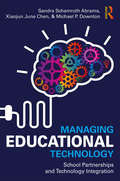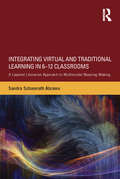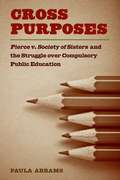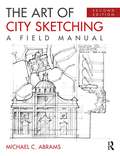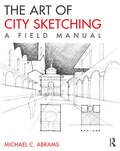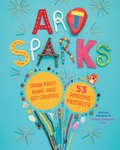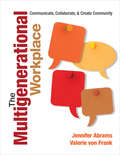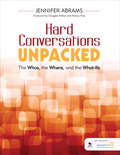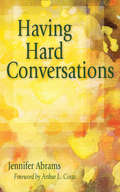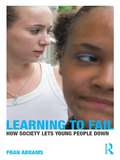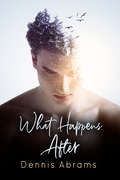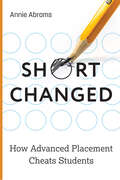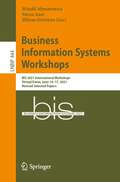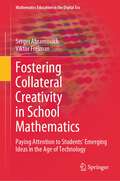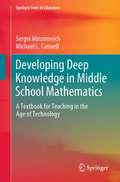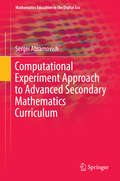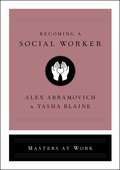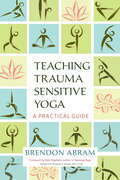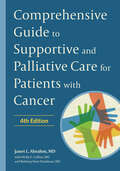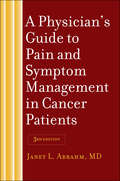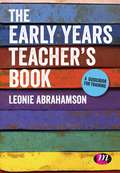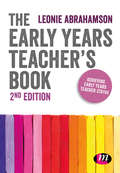- Table View
- List View
Managing Educational Technology: School Partnerships and Technology Integration
by Sandra Schamroth Abrams Xiaojun June Chen Michael P. DowntonManaging Educational Technology: School Partnerships and Technology Integration by Sandra Schamroth Abrams, Xiaojun June Chen, and Michael P. Downton. Sandra Schamroth Abrams is an associate professor in the Department of Curriculum and Instruction at St. John’s University, USA. Xiaojun Chen is an associate professor of educational technologies in the Department of Curriculum and Instruction at St. John’s University, USA. Michael P. Downton is an assistant professor in the Department of Curriculum and Instruction at St. John’s University, USA.
Integrating Virtual and Traditional Learning in 6-12 Classrooms: A Layered Literacies Approach to Multimodal Meaning Making
by Sandra Schamroth AbramsIntegrating Virtual and Traditional Learning in 6-12 Classrooms introduces a model of "layered literacies" as a framework for describing and illustrating how students’ digital experiences can inform educational methods. Through the lens of layered literacies, educators can envision opportunities to draw upon adolescents’ out-of-school interests and activities to meaningfully integrate digital practices within academic contexts. Such an approach facilitates innovative teaching, inspired learning, and successful pedagogy, and it thoughtfully highlights the role of technology within mandated standards-based instruction in public schools. Combining foundational and contemporary theories, supported by data from multiple studies of adolescent learning, and honoring teachers’ and students’ experiences and resources, this text helps educators reconceptualize the ways students learn through and with digital texts and negotiate the connection between online and offline spaces. A companion website extends the discussion onto the screen, engaging readers in an intertextual approach to learning that complements the concept of layering literacies across disciplines. With a foreword by Jennifer Rowsell and an afterword by Bill Cope and Mary Kalantzis, it will be of interest to experienced educators and administrators, as well as postgraduate, graduate, and undergraduate students of education.
Education and the Commercial Mindset
by Samuel E. AbramsThe movement to privatize K-12 education is stronger than ever. Samuel Abrams examines the rise of market forces in public education and reveals how a commercial mindset that sidesteps fundamental challenges has taken over. Nevertheless, public schools should adopt lessons from the business world, such as raising teacher salaries to attract talent.
Cross Purposes: Pierce v. Society of Sisters and the Struggle over Compulsory Public Education
by Paula Abrams"A definitive study of an extremely important, though curiously neglected, Supreme Court decision,Pierce v. Society of Sisters. " ---Robert O'Neil, Professor of Law Emeritus, University of Virginia School of Law "A careful and captivating examination of a dramatic and instructive clash between nationalism and religious pluralism, and of the ancient but ongoing struggle for control over the education of children and the formation of citizens. " ---Richard W. Garnett, Professor of Law and Associate Dean, Notre Dame Law School "A well-written, well-researched blend of law, politics, and history. " ---Joan DelFattore, Professor of English and Legal Studies, University of Delaware In 1922, the people of Oregon passed legislation requiring all children to attend public schools. For the nativists and progressives who had campaigned for the Oregon School Bill, it marked the first victory in a national campaign to homogenize education---and ultimately the populace. Private schools, both secular and religious, vowed to challenge the law. The Catholic Church, the largest provider of private education in the country and the primary target of the Ku Klux Klan campaign, stepped forward to lead the fight all the way to the U. S. Supreme Court. InPierce v. Society of Sisters(1925), the court declared the Oregon School Bill unconstitutional and ruled that parents have the right to determine how their children should be educated. Since then, Pierce has provided a precedent in many cases pitting parents against the state. Paula Abrams is Professor of Constitutional Law at Lewis & Clark Law School.
The Art of City Sketching: A Field Manual
by Michael C. AbramsThe Art of City Sketching: A Field Manual guides readers through the process of freehand architectural sketching and explains orthographic, diagrammatic, three-dimensional, and perceptual-type drawings. The book presents hundreds of drawings of historic buildings and urban spaces, examples, and exercises, which help readers develop their drawing skills and employ sketching as an analytical tool. The book is divided into three parts, based on the reader’s skill level: beginner, intermediate, and advanced. As an architect and field sketching instructor, the author shows that through drawing the reader can discover, analyze, and comprehend the built environment. The new edition of The Art of City Sketching expands on the drawing techniques of the previous version by adding new drawing examples, exercises, and two new chapters—Chiaroscuro and Storyboard. New drawing tips, demonstrations, and composition "do’s and don’ts" will support readers when they illustrate their viewpoint of the city by using simple drawing tools. The lessons in this book will allow readers to mix method with imagination and sensibility.
The Art of City Sketching: A Field Manual
by Michael AbramsThe Art of City Sketching: A Field Manual guides you through the laborious and sometimes complex process of sketching what you see in the built environment so that you can learn to draw what you imagine. Illustrated with hundreds of drawings by students and professionals of cityscapes around Europe and the United States, the book helps you develop your conceptual drawing skills so that you can communicate graphically to represent the built environment. Short exercises, projects, drawing tips, step-by-step demonstrations, and composition do's and don'ts make it easy for you to get out into the city and experiment in your own work. Author Michael Abrams uses his experience as a field sketching instructor, to show you that by drawing, you can discover, analyze, and comprehend the built environment.
Art Sparks: Draw, Paint, Make, and Get Creative with 53 Amazing Projects!
by Marion Abrams Hilary Emerson LayEvery kid can be an artist with this book as their guide! Using basic art supplies — from paint, markers, paper, and glue to household finds like cardboard boxes and fabric scraps — children aged 6 and up learn that as long as they can imagine it, they can create it. Curated by two art educators with decades of experience, this rich collection of 53 arts and crafts activities offers up a ton of freeform fun, from Doodlemonsters and Painted Animal Rocks to Paper Bead Jewelry and Nature Weaving. Projects vary in difficulty so there’s something for a wide range of ages and abilities, and many can be completed in under an hour. Each project featured in the book has been kid-made (and kid-approved!), and colorful photos of the finished pieces will ignite a creative spark that inspires budding makers to express their imagination, humor, and individuality through art. This publication conforms to the EPUB Accessibility specification at WCAG 2.0 Level AA.
The Multigenerational Workplace: Communicate, Collaborate, and Create Community
by Jennifer B. Abrams Valerie Von FrankBridge the generation gap and achieve outstanding results! Age-related misunderstandings don’t arise just between teachers and students—in some schools, staff from four generations might work side by side. In this book, based on a popular workshop, educators can learn how to look past generational filters to improve communication and reap the benefits of collaboration. Focusing on the major contexts of recruitment, coaching, professional learning, and succession planning, the book offers: Tools, checklists, and recommendations for professional learning that meets multigenerational needs Professional development activities that cultivate understanding of generational differences and strengthen workplace culture Real-life stories and case studies
Hard Conversations Unpacked: The Whos, the Whens, and the What-Ifs
by Jennifer B. AbramsLearn to speak up for what really matters In Having Hard Conversations, Jennifer Abrams showed educators how to confront colleagues about work-related issues through a planned, interactive, and personal approach. In this sequel, readers move deeper into preparing for those conversations while building expectations for meaningful outcomes. Emphasizing what needs to happen before, during, and after hard conversations, this resource explores What humane, growth-producing, and “other-centered” conversations sound like How to recognize and account for culture, gender, and generational filters How to spot and work with organizational dynamics that could influence discussions How to conduct hard conversations with supervisors
Hard Conversations Unpacked: The Whos, the Whens, and the What-Ifs
by Jennifer B. AbramsLearn to speak up for what really matters In Having Hard Conversations, Jennifer Abrams showed educators how to confront colleagues about work-related issues through a planned, interactive, and personal approach. In this sequel, readers move deeper into preparing for those conversations while building expectations for meaningful outcomes. Emphasizing what needs to happen before, during, and after hard conversations, this resource explores What humane, growth-producing, and “other-centered” conversations sound like How to recognize and account for culture, gender, and generational filters How to spot and work with organizational dynamics that could influence discussions How to conduct hard conversations with supervisors
Having Hard Conversations
by Jennifer B. AbramsSpeak with clarity, confidence, and courage! Many educators struggle with discussing difficult issues with colleagues. This insightful book helps readers effectively lead challenging conversations with supervisees, peers, and supervisors. Emphasizing initiative and preparation as keys to a successful conversation, the author’s step-by-step approach provides: Thought-provoking questions and first-person accounts that help build communications skills Advice on overcoming personal hesitation about expressing concerns Guidance on goal setting and choosing the best “what-where-and-when” for a productive discussion Sample scripts and other interactive tools to help educators prepare for the conversation and achieve positive outcomes
Learning to Fail: How Society Lets Young People Down
by Fran AbramsDuring a decade of relative prosperity from the mid-1990s onward, governments across the developed world failed to crack one major issue – youth unemployment. Even when economic growth was strong, one young person in 10 in the United Kingdom was neither working nor learning. As the boom ended, the number of young people dropping out after leaving school – already acknowledged to be too high - began to rise at an alarming rate. As governments face up to the prospect of a new generation on the dole, this book examines the root causes of the problem. By holding a light to the lives and attitudes of eight young people, their families, their teachers and their potential employers, this book will challenge much of what has been said about educational success and failure in the past 20 years. For two decades, policy makers largely assumed schools were the key to ensuring young people got the best possible start in life. Yet for many children the path to failure began well before their first day at school. Through the stories of these young people, this book reveals how marginalised young people are let down on every step of their journey. Growing up in areas where aspiration has died or barely ever existed, with parents who struggle to guide them on life in the 21st century, they are let down by schools where teachers underestimate them, by colleges and careers advisers who mislead them and by an employment market which has forgotten how to care or to nurture. Learning to Fail goes behind the headlines about anti-social behaviour, drugs and teenage pregnancy to paint a picture of real lives and how they are affected by outside forces. It gives a voice to ordinary parents and youngsters so they can speak for themselves about what Britain needs to do to turn its teenage failures into a success story.
What Happens After
by Dennis AbramsCollin and his best friend, Nate, are high school juniors living in a suburb of Houston, where the politically and culturally conservative attitude makes coming out beyond difficult. One night they decide it would be a bit of harmless fun to sneak into a gay club in the city—a chance to dance, check out guys, and meet others like themselves. They couldn’t be more wrong. In minutes everything Collin took for granted is destroyed when a shooter’s bullets tear through the club. Collin survives, but that’s only the start of his ordeal. In the aftermath he has to face the loss of his friend, survivor’s guilt, the pain of his wounds, and judgment when he’s outed on a national level. Making it through his last year of school feels impossible when life as he knew it will never be the same.
Shortchanged: How Advanced Placement Cheats Students
by Annie AbramsHow the College Board's emphasis on standardized testing has led the AP program astray.Every year, millions of students take Advanced Placement (AP) exams hoping to score enough points to earn college credit and save on their tuition bill. But are they getting a real college education? The College Board says that AP classes and exams make the AP program more accessible and represent a step forward for educational justice. But the program's commitment to standardized testing no longer reflects its original promise of delivering meaningful college-level curriculum to high school students. In Shortchanged, education scholar Annie Abrams uncovers the political and pedagogical traditions that led to the program's development in the 1950s. In revealing the founders' intentions of aligning liberal arts education across high schools and colleges in ways they believed would protect democracy, Abrams questions the collateral damage caused by moving away from this vision. The AP program is the College Board's greatest source of revenue, yet its financial success belies the founding principles it has abandoned. Instead of arguing for a wholesale restoration of the program, Shortchanged considers the nation's contemporary needs. Abrams advocates for broader access to the liberal arts through robust public funding of secondary and higher education and a dismantling of the standardized testing regime. Shortchanged illuminates a better way to offer a quality liberal arts education to high school students while preparing them for college.
Business Information Systems Workshops: BIS 2021 International Workshops, Virtual Event, June 14–17, 2021, Revised Selected Papers (Lecture Notes in Business Information Processing #444)
by Witold Abramowicz Sören Auer Milena StróżynaThis book constitutes revised papers from the eight workshops which were held during June 2021 at the 24th International Conference on Business Information Systems, BIS 2021. The conference was planned to take place in Hannover, Germany, and changed to a fully online event due to the COVID-19 pandemic. There was a total of 67 submissions to all workshops of which 31papers were accepted for publication. The workshops included in this volume are: AKTB 2021: 12th Workshop on Applications of Knowledge-Based Technologies in Business BisEd 2021: BIS Education: Trends and Challenges DigBD 2021: 1st Workshop on Digitization in the Flux of Big Data Scenarios DigEx 2021: 3rd International Workshop on transforming the Digital Customer Experience iCRM 2021: 6th International Workshop on Integrated Social CRM QOD 2021: 4th Workshop on Quality of Open Data BITA 2021: 12th Workshop on Business and IT Alignment BSCT 2021: 4th Workshop on Blockchain and Smart Contract Technologies
Fostering Collateral Creativity in School Mathematics: Paying Attention to Students’ Emerging Ideas in the Age of Technology (Mathematics Education in the Digital Era #23)
by Sergei Abramovich Viktor FreimanThis book explores the topic of using technology, both physical and digital, to motivate creative mathematical thinking among students who are not considered ‘mathematically advanced.’ The book reflects the authors’ experience of teaching mathematics to Canadian and American teacher candidates and supervising several field-based activities by the candidates. It consists of eight chapters and an Appendix which includes details of constructing computational learning environments.Specifically, the book demonstrates how the appropriate use of technology in the teaching of mathematics can create conditions for the emergence of what may be called ‘collateral creativity,’ a notion similar to Dewey’s notion of collateral learning. Just as collateral learning does not result from the immediate goal of the traditional curriculum, collateral creativity does not result from the immediate goal of traditional problem solving. Rather, mathematical creativity emerges as a collateral outcome of thinking afforded by the use of technology. Furthermore, collateral creativity is an educative outcome of one’s learning experience with pedagogy that motivates students to ask questions about computer-generated or tactile-derived information and assists them in finding answers to their own or the teacher’s questions. This book intends to provide guidance to teachers for fostering collateral creativity in their classrooms.
Developing Deep Knowledge in Middle School Mathematics: A Textbook for Teaching in the Age of Technology (Springer Texts in Education)
by Sergei Abramovich Michael L. ConnellThis textbook is for prospective teachers of middle school mathematics. It reflects on the authors’ experience in offering various mathematics education courses to prospective teachers in the US and Canada. In particular, the content can support one or more of 24-semester-hour courses recommended by the Conference Board of the Mathematical Sciences (2012) for the mathematical preparation of middle school teachers. The textbook integrates grade-appropriate content on all major topics in the middle school mathematics curriculum with international recommendations for teaching the content, making it relevant for a global readership. The textbook emphasizes the inherent connections between mathematics and real life, since many mathematical concepts and procedures stem from common sense, something that schoolchildren intuitively possess. This focus on teaching formal mathematics with reference to real life and common sense is essential to its pedagogical approach. In addition, the textbook stresses the importance of being able to use technology as an exploratory tool, and being familiar with its strengths and weaknesses. In keeping with this emphasis on the use of technology, both physical (manipulatives) and digital (commonly available educational software), it also explores e.g. the use of computer graphing software for digital fabrication. In closing, the textbook addresses the issue of creativity as a crucial aspect of education in the digital age in general, and in mathematics education in particular.
Computational Experiment Approach to Advanced Secondary Mathematics Curriculum (Mathematics Education in the Digital Era #3)
by Sergei AbramovichThis book promotes the experimental mathematics approach in the context of secondary mathematics curriculum by exploring mathematical models depending on parameters that were typically considered advanced in the pre-digital education era. This approach, by drawing on the power of computers to perform numerical computations and graphical constructions, stimulates formal learning of mathematics through making sense of a computational experiment. It allows one (in the spirit of Freudenthal) to bridge serious mathematical content and contemporary teaching practice. In other words, the notion of teaching experiment can be extended to include a true mathematical experiment. When used appropriately, the approach creates conditions for collateral learning (in the spirit of Dewey) to occur including the development of skills important for engineering applications of mathematics. In the context of a mathematics teacher education program, the book addresses a call for the preparation of teachers capable of utilizing modern technology tools for the modeling-based teaching of mathematics with a focus on methods conducive to the improvement of the whole STEM education at the secondary level. By the same token, using the book's pedagogy and its mathematical content in a pre-college classroom can assist teachers in introducing students to the ideas that develop the foundation of engineering profession.
Becoming a Social Worker (Masters at Work)
by Alex Abramovich Tasha BlaineA revealing guide to a career as a social worker based on the real-life experiences of three distinguished social workers—required reading for anyone considering a path to this profession.Becoming a Social Worker takes you behind the scenes to find out what it&’s really like, and what it really takes, to become a social worker. Acclaimed authors Alex Abramovich and Tasha Blaine shadow three distinguished social work professionals to reveal how this compassionate field changes lives. Discover what it&’s like to tirelessly advocate for victims of domestic violence and sex trafficking, investigate accidental drug overdose deaths in New York City, and assist clients in a full-time private practice. Gain insight from these social worker&’s paths as they offer wisdom and insight from their years of service. Social workers have a common mission to serve people in need—here is how this life-changing job is actually practiced at the highest levels.
Teaching Trauma-Sensitive Yoga: A Practical Guide
by Brendon Abram Mark Stephens Margaret A. HowardA practical, hands-on, experienced-based guide from a military veteran turned yoga teacherBrendon Abram combines his first-hand experience with PTSD in the field and years of teaching to offer this practical guide to bringing trauma-sensitive yoga to both clinical and studio settings. Drawing on his work with military veterans, first responders, and survivors of domestic and sexual abuse, he emphasizes the importance of respecting the uniqueness of every individual and demonstrates how to use the foundational principles of yoga to create a safe experience. Abram explains that basic principles of yoga bring power to the practice and that breath, mindful movement, focused awareness, and acceptance of present-moment experience form the foundation of any yoga offering.
Comprehensive Guide to Supportive and Palliative Care for Patients with Cancer
by Janet L. AbrahmLeading palliative care experts illustrate how you can improve both communication with cancer patients and their quality of life.For more than twenty years, this guide has been the go-to resource for busy practicing oncology and palliative care clinicians. This fourth edition, now titled Comprehensive Guide to Supportive and Palliative Care for Patients with Cancer, provides physicians, advanced practice clinicians, and patients and their families with detailed information and advice for alleviating the suffering of cancer patients and their loved ones. Drawing on the work of experts who have developed revolutionary approaches to symptom management and palliative care, as well as on lessons learned during her decades as a teacher and clinician, Dr. Janet L. Abrahm and her coauthors illustrate how to help patients and families understand their prognosis, communicate their care preferences, and minimize their distress.This edition reflects important updates in the field while addressing the informational needs of a broader market of health care providers, including social workers, psychologists, psychiatrists, bereavement counselors, and chaplains. This new edition features three new chapters—"Spiritual Care in Palliative Care," "Psychological Considerations," and "Bereavement"—as well as specific guidelines about • advance care planning at all phases of cancer• understanding complex family dynamics and communication challenges• partnering with interpreters in the care of patients and family members with limited English-language proficiency• special considerations to take into account for LGBTQ+ patients and their loved ones• caring for patients who have a serious mental illness along with a cancer diagnosis• nonpharmacologic management of pain and other symptoms associated with cancer or its treatmentThe book features self-reflective exercises that encourage readers to consider their own biases before having discussions with patients and family members, as well as numerous patient stories that illustrate the techniques and insights clinicians can use to provide holistic, multidimensional care for a diverse cancer patient population.
A Physician's Guide to Pain and Symptom Management in Cancer Patients
by Janet L. AbrahmThis highly regarded handbook provides clinicians with the information they need to treat their cancer patients effectively and compassionately.This comprehensive guide to managing pain and other symptoms for people with cancer has helped tens of thousands of patients and families. Designed for busy practicing clinicians, A Physician's Guide to Pain and Symptom Management in Cancer Patients provides primary care physicians, advanced practice nurses, internists, and oncologists with detailed information and advice for alleviating the stress and pain of patients and family members alike. Drawing on the work of experts who have developed revolutionary approaches to symptom management and palliative care, as well as on the lessons learned from patients and their families during her thirty years as a teacher and clinician, Dr. Janet L. Abrahm shows how physicians and other caregivers can help patients and families heal emotionally even as the disease progresses.The third edition includes updates to medications and clinical stories, and features two new chapters: "Working with Patients’ Families" and "Sexuality, Intimacy, and Cancer." New lessons from palliative care and hospice care can help patients, their professional caregivers, and their families support each other every step of the way.
Harcourt School Publishers Collections: Journeys of Wonder
by Richard F. Abrahamson Alma Flor Ada Bernice E. Cullinan Margaret Mckeown Judy Wallis Junko Yokota Hallie Kay Yopp Nancy Roser Patricia SmithIn Journeys of Wonder, the stories, poems, and articles will take you to many exciting places. You will meet many unusual characters and read about interesting facts. Some stories might even make you laugh out loud. You can learn something new on every reading journey. As you read this book, you will learn to be a better reader.
The Early Years Teacher's Book: Achieving Early Years Teacher Status
by Leonie AbrahamsonIf you are an Early Years Teacher Trainee, this book is written for you. It will help you to successfully achieve your Early Years Teacher Status and practice with confidence. This book guides you through what you need to know about Early Years Teacher Status step-by-step. It explains how you can work to meet each of the Standards and assessment requirements. The author addresses trainees' common concerns about early years practice, study skills and meeting EYTS requirements, as well as giving many examples of the strategies that trainees found most helpful. The chapters explore each aspect of every Standard and indicator, with notes on theory, practical tips, case studies, activities and suggestions for further reading. This book helps you to: * understand all aspects of each Standard and indicator; * link your practice to the Standards; * understand the assessment requirements and how to strengthen your evidence; * plan and track your evidence; * complete your written assignments and create your portfolio with confidence; * develop the skills needed to take on a leadership role. This book also provides support for the mentor-mentee relationship and includes guidance for mentors, teaching activities for tutors and support for assessors. This book is a valuable resource for all those involved in EYTS and will be useful for: - EYTS trainees - their mentors - their placement tutors - course lecturers - EYTS assessors
The Early Years Teacher's Book: Achieving Early Years Teacher Status
by Leonie AbrahamsonThis book guides you through what you need to know about Early Years Teacher Status step by step. It explains how you can work to meet each of the Standards and assessment requirements. The author addresses trainees’ common concerns about early years practice and study skills and meeting EYTS requirements and gives many examples of the strategies that trainees found most helpful. Each chapter explores each aspect of every Standard and indicator, with notes on theory, practical tips, case studies, activities and suggestions for further reading. This book helps you to: • understand all aspects of each Standard and indicator • link your practice to the Standards • understand the assessment requirements and how to strengthen your evidence • plan and track your evidence • complete your written assignments and create your portfolio with confidence • develop the skills needed to take on a leadership role This Second Edition has been updated to include new guidance on Standard 7 around the Prevent Agenda and the work of Channel. The text is also updated to include information on the 'Integrated review' at age 2.
